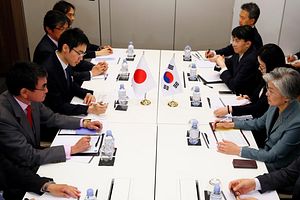On June 19, the South Korean government made Japan an interesting offer. It suggested that South Korean and Japanese companies set up a joint compensation fund through voluntary contributions. The fund would then be used to compensate those people deemed by the courts hearing an ongoing lawsuit to have been wartime forced laborers, mobilized from the Korean Peninsula during World War II. South Korea made it clear that if Japan accepted its proposal, Seoul would accede to Tokyo’s request for diplomatic talks based on the 1965 treaty known as the Agreement on the Settlement of Problems Concerning Property and Claims and on Economic Co-operation between Japan and the Republic of Korea.
The Japanese government rejected the offer on the day it was made, and talks between the two countries once again reached an impasse.
The sudden proposal to set up a fund is typical of the current South Korean government’s handling of historical issues between South Korea and Japan. Seoul’s policy is inconsistent. After the Supreme Court of Korea’s judgment on conscripted factory workers was handed down on October 30 last year, the South Korean government considered a bill for dealing with the court’s decision, in which the most likely approach was the joint fund that was in fact proposed last month. At the time, the Japanese government watched the progress of the bill with considerable interest.
In January, however, the South Korean government – or to be more precise, the Blue House – rejected the fund idea, claiming it was out of the question. Apparently, Seoul wanted the ball to be in Tokyo’s court. But in May, after the Japanese government proposed diplomatic consultations over the interpretation of the 1965 treaty, and called for the selection of arbitration board members based on the Agreement, South Korea suddenly changed tack. Seoul began to hint that it was considering the fund after all, and once again waited for Japan to react.
The volte face reveals South Korea’s lack of any consistent policy. Instead, Seoul is simply making ad hoc responses to Tokyo.
Indeed, the details of the fund proposed by South Korea have yet to be worked out to any extent. Apparently, the government is afraid that setting up a joint compensation fund would prompt many former Korean wartime laborers to come forward with their forced labor experiences, causing compensation to balloon. This latest proposal from Seoul leaves the question unanswered.
There is another issue: The South Korean government did not consult fully with the parties to the lawsuit in making this latest proposal. When it comes to historical recognition questions with Japan, the Moon Jae-in administration often calls for an approach that puts the victims themselves front and center. The reality, however, is quite different.
For example, since November 2018, the South Korean government has worked to dissolve the Reconciliation and Healing Foundation, which was established on the basis of the Japan-South Korea comfort women agreement reached at the end of 2015. As a result, there have been delays in the payment of support funds to some former comfort women. Now the same thing is happening with the wartime forced laborers. Almost 74 years after the end of World War II and the Japanese colonial rule of the Korean Peninsula, the victims are well over 90 years old. The governments of the two countries are wasting what little time remains for the survivors. That hardly seems to be putting the victims front and center.
In the first place, an offer for diplomatic consultations on the interpretation of the 1965 treaty, and the selection of arbitration board members, both of which Japan is demanding, are procedures stipulated by the treaty, and the South Korean government is obliged to agree. It is inappropriate for the South Korean government to make its unilateral proposal a condition for acceptance of diplomatic consultations. This is not an honest and sincere response, and criticism of it is only to be expected.
According to a prearranged plan, Japan’s proposal to hold diplomatic talks for selecting a third country that will choose the arbitration board members based on the treaty will be brought to the International Court of Justice separately after a deadline of 30 days for the reply. Of course, the proceedings of the International Court of Justice will not commence unless both the Japanese and South Korean governments agree. In other words, unless the South Korean government agrees, no proceedings will commence at all.
But what is important here is that the South Korean government’s current approach will make a strong impression on the international community, with its slippery handling of the historical issues that lie between it and Japan. As a former human rights lawyer, the president of South Korea really ought to do better.
Kan Kimura is a professor at Kobe University.

































